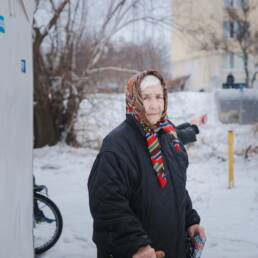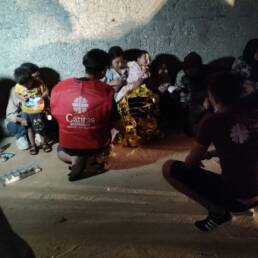Download the full report
Caritas Europa and ICMC Europe are very pleased to launch their new publication, entitled “Fostering community sponsorships across Europe”, available in English and French, that analyses the emergence of community sponsorship schemes in Europe.
This publication was produced in the framework of the ICMC-led SHARE Integration Project in cooperation with the Community Sponsorship Working Group, which includes Caritas Europa, ICMC Europe, Consorzio Communitas/Caritas Italiana, Caritas Salford, Caritas International (Caritas Belgium) and Secours Catholique Caritas France (SCCF).
Community sponsorships within the context of increased protection needs globally
While 70 million people were forced to flee their home globally in 2018, more safe and legal pathways to reach protection in Europe are crucially needed.
Private sponsorship programmes combine safe and legal access with tailor-made integration support offered by local volunteer groups. Sponsorship programmes, if well designed, can thus offer an important complementary pathway with places in addition to traditional resettlement, while also enhancing a local welcome and diversity. Sponsorship programmes are thus a valuable tool to meet the objectives and targets of the Global Compact on Refugees and the three-year strategy.
In the publication, we examine a number of critical questions: How sponsorship schemes can create additional safe and legal admission pathways for refugees? To what extent sponsorship programmes can enhance social inclusion? What practical arrangements and partnership frameworks are needed for quality-control mechanisms which ensure the well-being of sponsored refugees?
Three main approaches to community sponsorship
The publication analyses the implementation of three main approaches to community sponsorship in Europe since 2013. These include: sponsorships linked to extended family reunification in Germany, Ireland and France; Humanitarian Corridors in Italy, France, and Belgium relying on the issuance of a humanitarian visa; and resettlement based community sponsorships in the UK, Germany and Ireland which rely on referrals from UNHCR.
Four case studies of Eritrean and Syrian families who arrived in small towns and municipalities in Belgium, France, Italy and the UK provide testimony as to how community sponsorships can transform people’s lives.
The power of the people to contribute to more welcoming societies
Small, local communities and volunteers are the powerhouse behind community sponsorship: sponsors support refugees in their reception and integration paths and introduce them to their social network. By fostering human encounters and breaking communication barriers between people coming from different backgrounds, community sponsorships can be a catalyst for creating more tolerant and inclusive societies, even in small municipalities with little tradition of having received refugees before.
“Welcoming refugees does not aim at changing these families nor integrating them into a supposedly French culture, which we find difficult to define ourselves (luckily enough, otherwise how boring would that be!). It aims at protecting these people from war and the risks of exile, and to support them as best as possible so that they can find their own path in France.”
Victor Brunier, Volunteer, France
The way forward
In order for community sponsorship to contribute durably to an increase of quality protection places, we put forward a set of recommendations.
Clear objectives and targets for complementary pathways and resettlement should be established to enhance transparency, and ensure that community sponsorships complement and are additional to resettlement. Likewise, the partnership framework between civil society actors and the state should also clearly define each actor’s roles and responsibilities, the duration of support, and the safeguarding mechanisms in place. Enhanced transparency is also needed in the criteria used to identify and select sponsored refugees.
Importantly, these programmes should complement, rather than replace, state service provision and legal obligation. Finally, civil society must keep a central place in developing programmes and need to set up self-governance and coordination mechanisms to foster high quality and sustainable sponsorship programmes. Adequate funding and support must be provided by the governments and the EU to help civil society and small-size municipalities and rural areas building and strengthening durable reception and integration activities.
More information
Leïla Bodeux
Senior Policy and Advocacy Officer
Tel: +32 (0)2 235 26 55
Mob: +32 (0)478 585 409
lbodeux@caritas.eu




